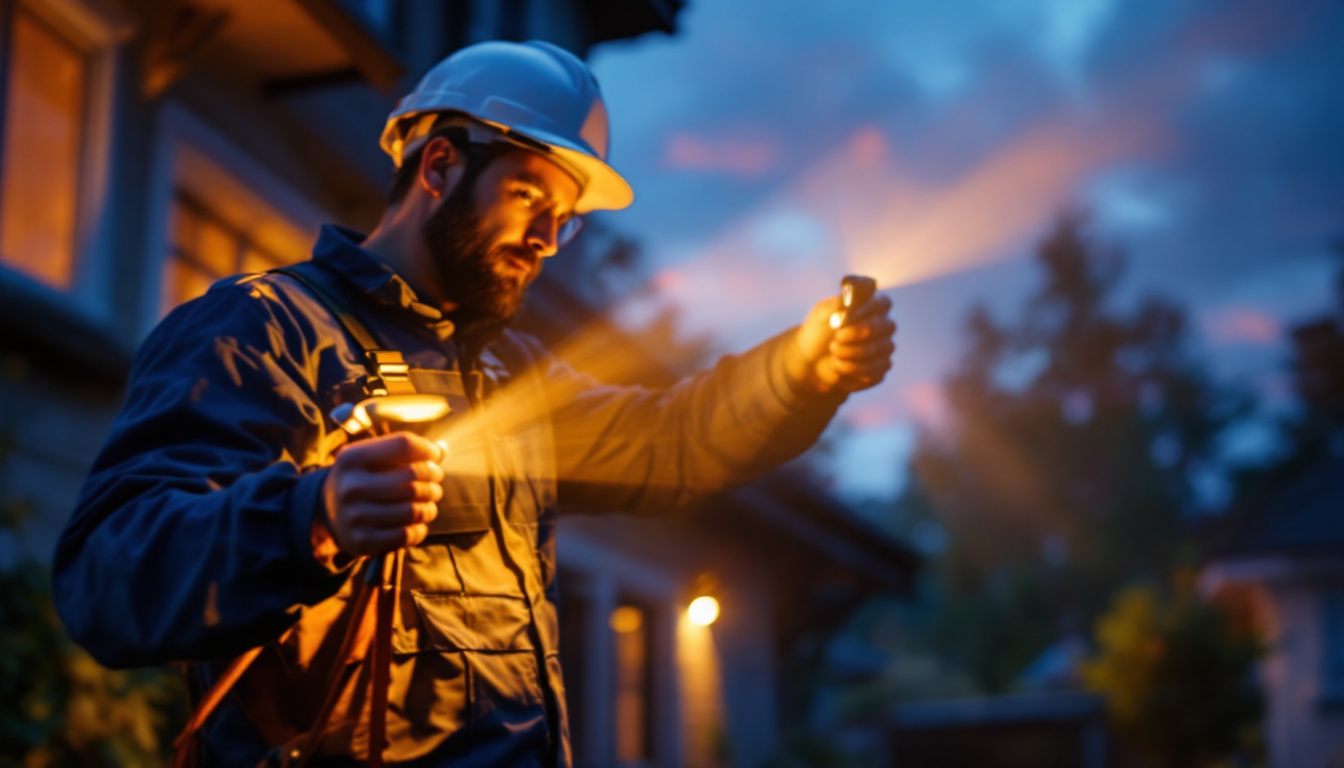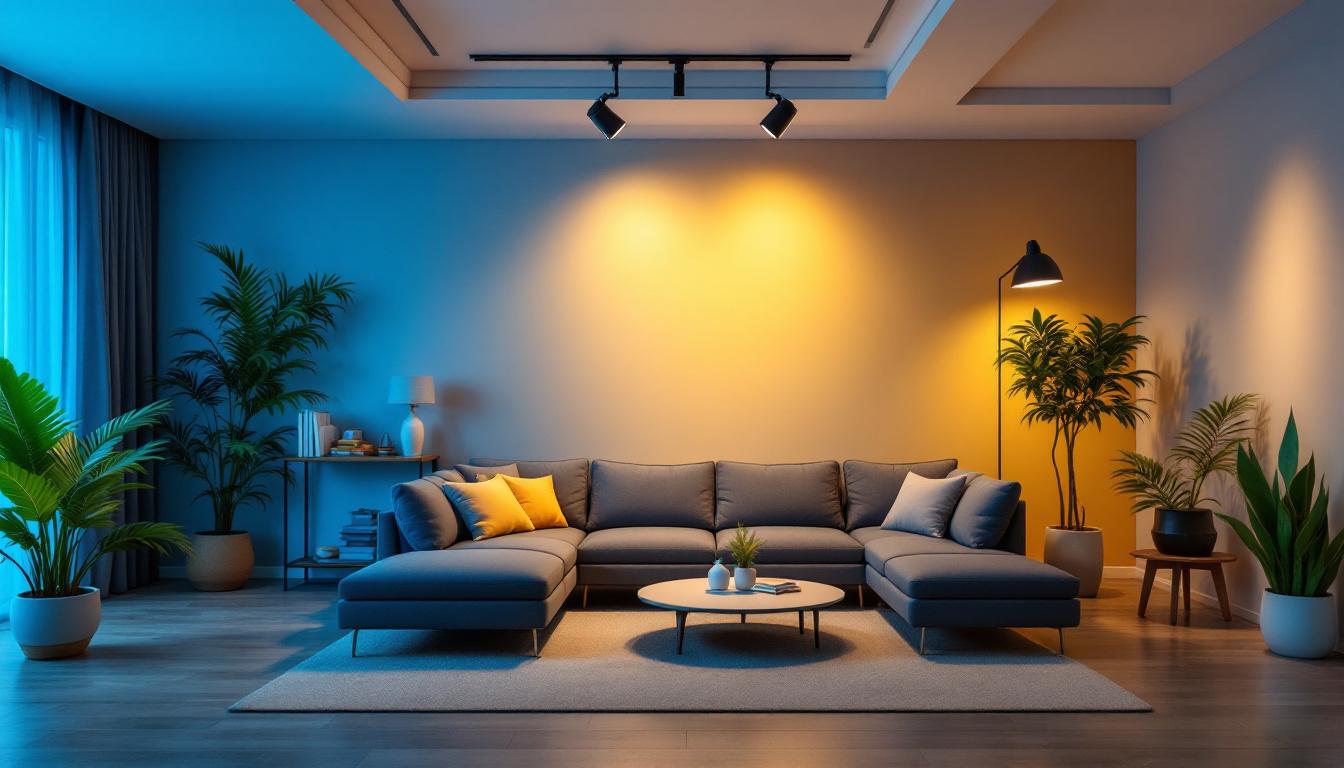
In the realm of outdoor lighting, flood lights stand out as a crucial component for both safety and aesthetics. For lighting contractors, understanding the significance of these fixtures can enhance their service offerings and elevate project outcomes. This article delves into the importance of outside flood lights, exploring their applications, benefits, and considerations for installation.
Flood lights are designed to illuminate large areas with powerful beams of light. Their versatility makes them suitable for various applications, from residential properties to commercial spaces and public areas.
In residential settings, flood lights enhance security by illuminating driveways, backyards, and entryways. Homeowners often seek these fixtures to deter potential intruders and provide a sense of safety. Additionally, flood lights can highlight landscaping features, creating a beautiful nighttime ambiance. Many homeowners choose to install motion-sensor flood lights, which activate when movement is detected, further enhancing security while conserving energy. These lights can also be used to create a welcoming atmosphere for outdoor gatherings, illuminating patios and decks for evening entertainment.
For commercial properties, flood lights are essential for security and safety. They are commonly used in parking lots, loading docks, and outdoor storage areas. The bright illumination helps prevent accidents and enhances visibility during nighttime operations. Furthermore, businesses can use flood lights to promote their brand by illuminating signage and architectural features. In industrial settings, flood lights are often mounted on tall poles to provide extensive coverage, ensuring that workers can navigate safely in low-light conditions. Additionally, energy-efficient LED flood lights are becoming increasingly popular, as they not only reduce energy costs but also have a longer lifespan, making them a cost-effective solution for businesses.
Flood lights are also vital in public spaces, such as parks and sports fields. They enable safe nighttime activities and events, ensuring that people can enjoy these areas after dark. For lighting contractors, understanding the specific needs of public spaces can lead to tailored solutions that enhance community experiences. For instance, in sports facilities, flood lights are strategically positioned to provide uniform lighting across the field, minimizing shadows and ensuring fair play. Moreover, during community events like festivals or concerts, flood lights can be used creatively to set the mood, highlighting stages and pathways while ensuring safety for attendees. The ability to adjust the brightness and color temperature of flood lights also allows for dynamic lighting designs that can transform a space for different occasions.
The installation of flood lights offers numerous advantages that can significantly impact both residential and commercial projects. Lighting contractors should be aware of these benefits to effectively communicate them to clients.
One of the primary reasons clients invest in flood lights is for security purposes. Well-lit areas deter criminal activity and provide peace of mind for property owners. Lighting contractors can emphasize that strategic placement of flood lights can create a sense of safety, making properties less attractive to potential intruders. Moreover, the presence of flood lights can help in monitoring activities around the property, as they illuminate dark corners and blind spots that might otherwise go unnoticed. This added visibility not only aids in preventing crime but also assists law enforcement in their patrols, as they can more easily spot suspicious behavior in well-lit areas.
Flood lights improve visibility during nighttime hours, which is crucial for both safety and functionality. For commercial properties, this means safer environments for employees and customers. In residential areas, well-lit pathways and driveways reduce the risk of accidents and injuries. Contractors can highlight how proper lighting design can enhance the usability of outdoor spaces. Additionally, flood lights can facilitate outdoor activities after dark, such as family gatherings, barbecues, or late-night work in the garden. By extending the usable hours of outdoor spaces, flood lights can significantly enhance the lifestyle of residents and the operational hours of businesses.
Beyond functionality, flood lights can enhance the aesthetic appeal of a property. By illuminating architectural features or landscaping, they create an inviting atmosphere. Lighting contractors can work with clients to design lighting schemes that not only serve practical purposes but also enhance the beauty of the property. Furthermore, the color temperature of flood lights can be tailored to suit the mood and style of the environment, whether it’s a warm glow for a cozy home or a bright, crisp light for a modern commercial façade. This versatility allows for creative expression in outdoor design, making properties stand out in the neighborhood or commercial district.
In today’s eco-conscious environment, energy efficiency is a significant consideration for clients looking to install flood lights. Many modern flood lights utilize LED technology, which consumes considerably less energy than traditional incandescent or halogen bulbs. This not only reduces electricity costs but also contributes to a smaller carbon footprint. Lighting contractors can educate clients on the long-term savings associated with energy-efficient lighting solutions, as well as the benefits of smart lighting systems that can be programmed to operate only when needed. By incorporating motion sensors or timers, clients can further optimize their energy usage, ensuring that lights are only on when necessary, thus promoting sustainability while enhancing security and visibility.
When selecting flood lights, several factors come into play. Lighting contractors must consider the specific needs of each project to recommend the most suitable options.
Flood lights come in various types, including LED, halogen, and metal halide. LED flood lights are increasingly popular due to their energy efficiency and long lifespan. In contrast, halogen lights provide a warm glow but consume more energy. Understanding the differences between these types allows contractors to make informed recommendations based on client preferences and project requirements.
The wattage of flood lights directly impacts their brightness. Contractors should assess the area that needs illumination and recommend appropriate wattage to achieve the desired effect. For larger areas, higher wattage may be necessary, while smaller spaces may require less intense lighting. It’s essential to balance brightness with energy efficiency to meet client expectations.
Modern flood lights often come with various control options, including motion sensors, timers, and remote controls. These features enhance convenience and energy efficiency. Contractors should discuss these options with clients, as they can significantly improve the functionality of the lighting system.
Proper installation is critical to the effectiveness of flood lights. Lighting contractors must pay attention to various factors to ensure optimal performance and safety.
The placement of flood lights is crucial for achieving the desired illumination. Contractors should consider factors such as the height of the fixtures, the angle of the light, and the areas that need coverage. Strategic placement can minimize shadows and maximize visibility, enhancing the overall effectiveness of the lighting system.
Flood lights require proper wiring and electrical connections to function safely and efficiently. Contractors must ensure that the electrical infrastructure can support the chosen flood lights, taking into account factors such as voltage and amperage. Adhering to local electrical codes is essential to ensure safety and compliance.
Since flood lights are often installed outdoors, they must be weather-resistant to withstand various environmental conditions. Contractors should select fixtures rated for outdoor use, ensuring they can endure rain, snow, and extreme temperatures. This consideration is vital for the longevity and reliability of the lighting system.
As the focus on sustainability grows, lighting contractors should prioritize energy-efficient solutions. Flood lights, particularly LED options, offer significant energy savings compared to traditional lighting systems.
LED flood lights consume less energy while providing the same or greater brightness than their halogen or metal halide counterparts. They also have a longer lifespan, reducing the frequency of replacements. By promoting LED technology, contractors can help clients lower their energy bills and reduce their carbon footprint.
Integrating smart lighting solutions can further enhance energy efficiency. Smart flood lights can be programmed to operate only when needed, using motion sensors or timers to reduce energy consumption. Contractors can educate clients on these technologies, showcasing the long-term benefits of investing in smart lighting systems.
Lighting contractors must be aware of local regulations and compliance requirements related to outdoor lighting. Understanding these guidelines ensures that installations meet safety standards and avoid potential legal issues.
Each municipality may have specific codes governing outdoor lighting, including restrictions on brightness, light pollution, and fixture placement. Contractors should familiarize themselves with these codes to ensure compliance during installation. This knowledge can also serve as a selling point for clients, demonstrating professionalism and expertise.
Beyond local codes, contractors should consider the environmental impact of outdoor lighting. Excessive light pollution can disrupt local ecosystems and affect wildlife. By designing lighting solutions that minimize light spill and glare, contractors can contribute to more sustainable practices in their projects.
Outside flood lights play a vital role in enhancing safety, visibility, and aesthetics for various properties. For lighting contractors, understanding the importance of these fixtures is essential for delivering high-quality services to clients. By considering the versatility, benefits, installation considerations, energy efficiency, and compliance requirements, contractors can provide tailored solutions that meet the unique needs of each project.
As the demand for outdoor lighting continues to grow, staying informed about the latest technologies and trends will empower lighting contractors to thrive in this competitive market. By prioritizing quality, efficiency, and sustainability, contractors can establish themselves as trusted experts in the field of outdoor lighting.
Ready to elevate your lighting projects with the best in flood lights? At LumenWholesale, we provide lighting contractors with exceptional, spec-grade lighting products at prices that can’t be beaten. Say goodbye to local distributor markups and hello to our premium selection that meets the highest industry standards. With free shipping on bulk orders, LumenWholesale is your go-to source for reliable, high-performance lighting that won’t break the bank. Don’t compromise on quality or value—choose LumenWholesale for your next project. Wholesale Lighting at the Best Value is just a click away.

Discover essential electrician tools and strategies to future-proof your lighting projects.

Discover how off center track lighting impacts lighting contractors’ bottom line, offering cost-saving tips, installation insights, and strategies to boost profitability—learn more now!.

Discover the impact of Shop Lights Work 48 LED 5000 Kelvin on modern lighting solutions.

Discover essential LED light artwork tips for lighting contractors to avoid common mistakes, enhance design quality, and deliver stunning, energy-efficient installations..